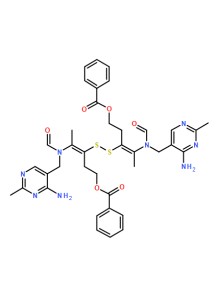Understanding Bisbentiamine
Bisbentiamine is a synthetic, lipid-soluble derivative of thiamine (vitamin B1). Unlike standard water-soluble forms such as thiamine hydrochloride or mononitrate, bisbentiamine offers improved bioavailability, especially at higher doses. Its lipid-soluble nature allows it to potentially cross the blood-brain barrier more effectively and achieve higher thiamine concentrations in blood and tissues, including the brain.
Potential Health Benefits
(Based on thiamine function and the unique properties of bisbentiamine)
The benefits of bisbentiamine primarily derive from its superior ability to deliver thiamine efficiently to the body and brain. Thiamine itself is critical for:
-
Energy Metabolism: The active form, thiamine pyrophosphate (TPP), is a cofactor for essential enzymes in carbohydrate metabolism, including pyruvate dehydrogenase, alpha-ketoglutarate dehydrogenase (Krebs cycle), and transketolase (pentose phosphate pathway).
-
Nervous System Function: Thiamine supports nerve signal transmission, myelin sheath integrity, and neurotransmitter synthesis.
1. Enhanced Bioavailability and Tissue Levels
Benefit: Bisbentiamine is absorbed more efficiently than standard thiamine and may achieve higher blood and tissue levels. This may allow for lower doses with effective outcomes, especially in deficiency states.
Citation Evidence:
-
Baker H, Frank O. Absorption, utilization and clinical effectiveness of allithiamines compared with crystalline thiamine. J Nutr Sci Vitaminol (Tokyo). 1976;22 Suppl:63–68.
-
Pincus JH, Cooper JR, Piros K, Turner I. The effect of thiamine derivatives on thiamine-dependent enzymes in the central nervous system. Brain Res. 1974;73(1):85–94.
These studies highlight the absorption and activity of lipid-soluble thiamine derivatives like bisbentiamine, showing better performance than standard water-soluble forms.
2. Support for Neurological Health
Benefit: Due to improved permeability across the blood-brain barrier, bisbentiamine may support neurological functions and help manage symptoms associated with thiamine deficiency, such as cognitive decline or Wernicke-Korsakoff Syndrome (WKS).
Citation Evidence:
-
Pincus JH, Cooper JR, Murphy JV, Rabe EF. Thiamine derivatives in experimental Wernicke's encephalopathy. Arch Neurol. 1973;28(4):251–254.
Although specific trials on bisbentiamine in WKS are limited, its class shows potential CNS advantages.
3. Managing Thiamine Deficiency States
Benefit: Bisbentiamine can be used to prevent or treat thiamine deficiency in conditions like beriberi and WKS. Its improved absorption may benefit individuals with compromised gut absorption (e.g., alcoholics, GI disorders, post-bariatric surgery).
Citation Evidence:
-
Nakano K, Nakayama H, Koyama S, Itagaki T, Fujii S. Studies on metabolism of thiamine disulfide O-monobenzoate (Bisbentiamine). III. Metabolism of bisbentiamine in rabbits and man. J Nutr Sci Vitaminol (Tokyo). 1975;21(4):233–243.
This study confirms metabolism and efficacy of bisbentiamine in human systems.
4. Potential Role in Impaired Glucose Metabolism
Benefit: Thiamine is essential for carbohydrate metabolism, and its deficiency or increased demand is sometimes seen in diabetes. While most studies focus on benfotiamine, bisbentiamine is also being investigated as a supportive option due to its similar profile.
Citation Evidence:
Although direct studies on bisbentiamine’s effect in diabetic complications (e.g., neuropathy, retinopathy) are limited, its role as a thiamine precursor suggests potential benefit. Further targeted research is needed.
Important Considerations
-
Research Focus: Most modern clinical trials emphasize benfotiamine over bisbentiamine for diabetic and neurological conditions.
-
Evidence Quality: Enhanced absorption is well-supported by pharmacokinetics, but there are fewer high-quality clinical trials demonstrating clear superiority in outcomes.
-
Medical Guidance: Always consult a healthcare provider before using bisbentiamine for specific conditions or long-term supplementation.
Summary
Bisbentiamine offers enhanced bioavailability compared to standard thiamine, potentially leading to greater thiamine concentrations in the body and brain. This makes it a promising option for supporting neurological health and managing deficiency. However, more direct clinical evidence is needed for its use in diabetes-related complications compared to its better-studied counterpart, benfotiamine.



